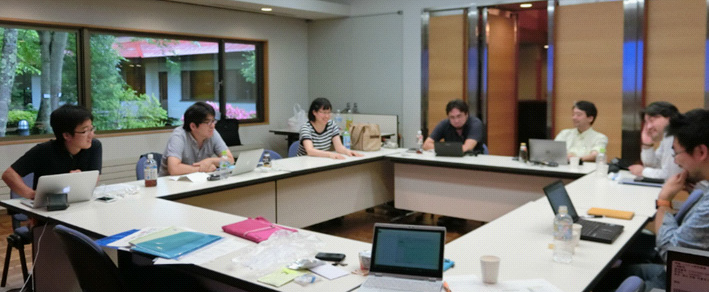AIR Newsletter Vol.3, No.2
本ニュースレターでは2016年6月から2016年11月までのAcceptable Intelligence with Responsibility (AIR)研究グループの活動を報告する。詳細はこちらを参照いただきたい。

人工知能学会で報告
2016年6月7日(火)、人工知能学会年次大会のオーガナイズドセッション「汎用人工知能とその社会への影響(2)」において、「人と機械の関係性:ステイクホルダーへのアンケート調査」を江間が報告した。より詳細なアンケート調査結果は『情報管理』2016年8月号に掲載された。
第8回ワークショップ@軽井沢
2016年7月9日(土)と10日(日)に、軽井沢にある国際高等セミナーハウスにて合宿を行った。価値が多様化している現在、異なる価値を持つ人やコミュニティが出会うと、想定外の対立や炎上が起きる。そこで、技術の社会実装を行う前に、多様で変化する価値に気付き予防的に安心して議論や試行錯誤ができる場や仕組みをどのように構築できるだろうかを議論した。
温故知新プロジェクト
温故知新プロジェクト第三弾として中島秀之氏(東京大学情報理工学系研究科・特任教授:人工知能)にインタビューを行い、主に1980年代AIUEOの活動など第二次人工知能ブームについてお伺いした。また、第四弾として、水谷雅彦氏(京都大学大学院文学研究科・教授:倫理学)にインタビューを行い、主に1990年代に行われたFINEプロジェクトについてお伺いした。
両インタビューの言行録は後日、本Webにて公開する。
第9回ワークショップ報告
今年も科学技術社会論学会にて「人工知能が浸透する社会を考える」オーガナイズドセッションを開催した。2014年はAIRメンバーの発表をもとに人工知能研究とは何か、誰をどこまで対話や議論の場に加えるか、誰にどのような責任があるのか、異分野間での共同研究をどのように行っていくかなどについて会場から寄せられた論点を軸に議論を行った(AIR Newsletter vol.1(2)参照)。2015年はAIRメンバーの発表に加え、様々な分野や職種の方をお招きし「人工知能と社会」について話題提供をいただいた(AIR Newsletter vol.2 (2)参照)。
「人工知能」という単語が様々な分野で言及されるようになった2016年現在、様々な場面において人工知能がもたらす可能性への期待があると同時に「機械に仕事を奪われるのではないか」、「人間ならではの創造的な仕事とは何か」、「そのための人材育成や教育の在り方をどのようにすればよいのか」などの不安や懸念がささやかれている。そこで3年目となる本年度のオーガナイズドセッションでは税理士や医師、棋士といった専門職に機械が入り込むことによって起きる変化や生じる課題の議論を行った。
今後の活動について
JST-RISTEXの新領域「人と情報のエコシステム」の新規研究プロジェクトにAIRメンバーによる提案「多様な価値への気づきを支援するシステムとその研究体制の構築」が採択された。研究期間は2016年11月1日から2019年10月までの3年間である。
AIR Newsletter Vol.3, No.2
The newsletter reports four AIR activities during June to November 2016.

1. Report: The Japanese Society for Artificial Intelligence
On June 7th, Arisa Ema presented a research conducted by AIR member: “Relationships between humans and machines: A questionnaire survey on stakeholders” at the 30th annual conference of the Japanese Society for Artificial Intelligence, 2016. The full paper was published at the Journal of Information Processing and Management in August 2016, entitled “Automated driving, nursing, disaster prevention: How far we could entrust Artificial Intelligence?: A questionnaire survey on various stakeholders” (doi: 10.1241/johokanri.59.322).
2. Report: 8th Workshop of AIR
On July 9th to 10th, 8th Workshop of AIR was held to discuss topics for collaborative research. We discussed how to create a place and mechanism to be aware of value diversities to prevent unexpected confrontation and flames arise. This workshop was supported by a funding from the National Institute of Informatics.
3. Report: AIR Oral History Project
On June 29th, we interviewed Hideyuki Nakashima, a project professor at the University of Tokyo, President Emeritus at the Future University Hakodate. The interview was mainly about the activity of AIUEO (Artificial Intelligence Ultra Eccentric Organization) during 1980s.
On September 23rd, we interviewed Masahiko Mizutani, a professor at the Kyoto University. The interview was mainly about the activity of FINE (Foundations of Information Ethics) project during 1990s.
Both interview data will be uploaded soon.
4. Report: 9th Workshop of AIR
On November 5th, we held the 9th Workshop of AIR at the 15th annual conference of the Japanese Society for Science and Technology Studies, the Hokkaido University. We invited four guests who investigate how Artificial Intelligence interacts a profession in various fields. Ikuko Kase (STS) introduced how tax preparers’ worry about their job undertaken by Artificial Intelligence and what kind of problems would occur due to software’s accident. Takanori Fujita (medical law) introduced how Artificial Intelligence is developed to be used as diagnosis of psychiatric care and its ethical, legal and social implications. Yusuke Inoue (medical ethics) introduces how Artificial Intelligence was used to promote understanding of cancer genomics. It raises various issues to consider such as responsibility and education of doctors. Akinori Kubo (cultural anthropology) introduces how Artificial Intelligence relativize humans’ recognition by citing comments from the shogi (Japanese chess) players. Lastly, Arisa Ema (STS) commented to these four case studies and suggested that Artificial Intelligence would not deprive “jobs” but it alters “tasks” of humans. Therefore, we need to consider what kind of “tasks” could/should and could/should not be altered to machines.
After the Workshop, the points below were discussed:
- It is important to discuss why we should introduce AI.
- “Narrative” becomes a keyword on medicine and it is important to balance both quality and quantity of data.
- It is important to construct redundant hybrid system of humans and machines to negotiate what kind of “tasks” should be and should not be done by AI.
5. Activity Plan
AIR project received a three-year-grant from JST-RISTEX from November 2016.